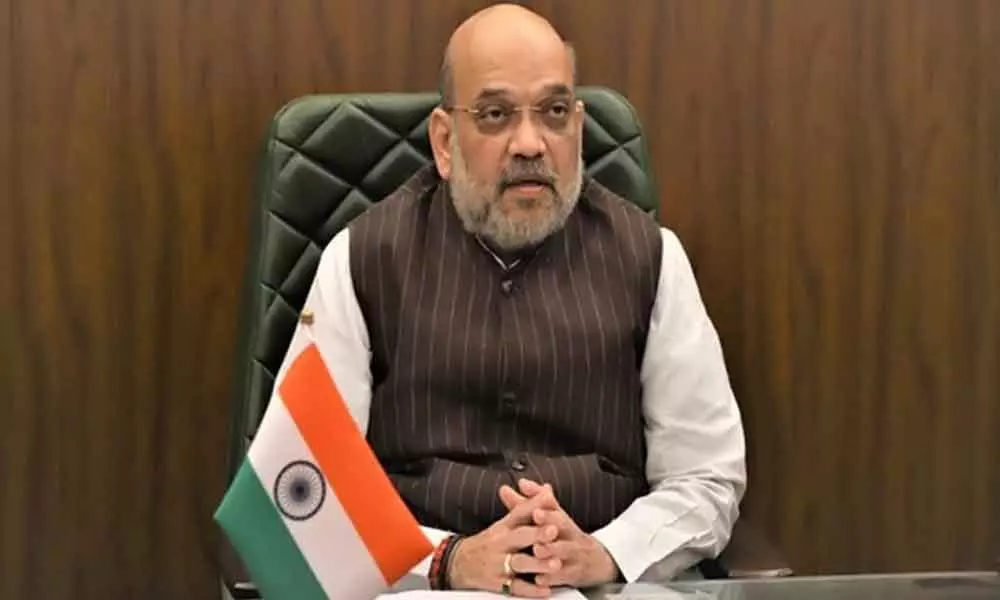Live
- Meet DJ Yogi: The Favorite DJ of Bollywood Celebrities and Sports Stars
- Synergy Marine Group Champions Onboard AI Agriculture for Healthier Crews and a Greener Future
- BJP alleges Rs 45 cr scam by AAP govt in school construction
- Yashoda Medicity organizes “Crown of Courage” ceremony to honor Cancer Survivors
- AAP appoints two-time legislator Arora as Punjab chief
- BJP won’t succeed in toppling Congress govt: K’taka Home Minister
- Turkey neutralises five Kurdish militants in Syria
- BJP questions Kejriwal on 21,000 deaths in Delhi due to contaminated water
- CM Revanth Reddy Inspects Progress of Telangana Mother Statue Installation
- ‘It’s Congress habit to spread lies’, says Vinod Tawde after sending legal notice to Kharge, Rahul
Just In

Union Home Minister Amit Shah
The 29th Southern Zonal Council meeting is scheduled for November 14 at Tirupati.
The 29th Southern Zonal Council meeting is scheduled for November 14 at Tirupati. Union Home Minister Amit Shah will chair the meeting, which will be attended by the Chief Ministers of Andhra Pradesh, Kerala, Karnataka, Tamil Nadu, Telangana, Puducherry and Lieutenant Governors of Puducherry, Andaman and Nicobar and Administrator of Lakshadweep.
In this regard, AP Chief Minister YS Jagan Mohan Reddy directed officials to bring out key issues pertaining to the State that need to be addressed and instructed them to be fully prepared for the meeting, even to those queries raised by the other States. The AP Chief Minister perhaps had inter-State water disputes and SCS in mind when he directed the officials to prepare a note on the key issues that need to be raised at the meeting. Maybe, he was asking them to give him a detailed note on all the inter-State issues concerning AP. Perhaps, he expects Telangana to raise the river water disputes.
A Zonal Council meeting is not only about inter-State issues. Most of such issues could be settled by the Chief Ministers themselves if they keep their politics aside and keep overall development of their States. This is a highly dependent world and within the country, the dependency is more among the States. The idea of creation of Zonal Councils was mooted by the first Prime Minister of India, Pandit Jawahar Lal Nehru, in 1956 when during the course of a debate on the report of the States Reorganisation Commission, he suggested that the States proposed to be reorganised may be grouped into four or five zones having an Advisory Council "to develop the habit of cooperative working" among them.
Pandit Nehru suggested this at a time when linguistic hostilities and bitterness as a result of re-organisation of the States on linguistic patterns were threatening the very fabric of our nation. As an antidote to this situation, it was suggested that a high-level advisory forum should be set up to minimise the impact of these hostilities and to create healthy inter-State and Centre-State environment with a view to solving inter-State problems and fostering balanced socio-economic development of the respective zones.
Each Zonal Council has set up a Standing Committee consisting of Chief Secretaries of the member-States. These Standing Committees meet from time to time to resolve the issues or to do necessary groundwork for further meetings of the Zonal Councils. Senior officers of the Planning Commission and other Central ministries are also associated with the meetings depending upon necessity. The Zonal Councils provide an excellent forum where irritants between the Centre and the States and amongst the States can be resolved through free and frank discussions and consultations.
They are regional fora of cooperative endeavour for States linked with each other economically, politically and culturally. Being compact high-level bodies, specially meant for looking after the interests of respective zones, they are capable of focussing attention on specific issues, considering regional factors, while keeping the national perspective in view. However, a win-win situation for all comes up only when a broader approach is adopted for the States. Let's see whether this meeting will be any different!

© 2024 Hyderabad Media House Limited/The Hans India. All rights reserved. Powered by hocalwire.com







